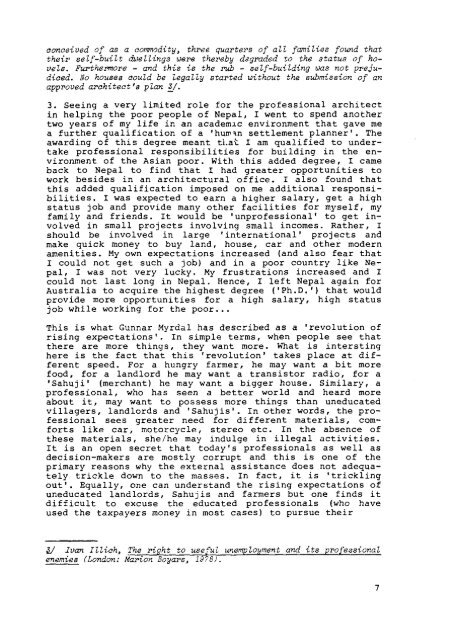Ifda dossier 47, May/June 1985
Ifda dossier 47, May/June 1985
Ifda dossier 47, May/June 1985
Create successful ePaper yourself
Turn your PDF publications into a flip-book with our unique Google optimized e-Paper software.
conceived of as a comodity, three quarters of all families found that<br />
their self-built dwellings were thereby degraded to the status of ho-<br />
vels. Furthermore - and this is the rub - self-building was not preju-<br />
diced. No houses could be legally started without the submission of an<br />
approved architect's plan Z/.<br />
3. Seeing a very limited role for the professional architect<br />
in helping the poor people of Nepal, I went to spend another<br />
two years of my life in an academic environment that gave me<br />
a further qualification of a 'humin settlement planner'. The<br />
awarding of this degree meant tl.at I am qualified to under-<br />
take professional responsibilities for building in the en-<br />
vironment of the Asian poor. With this added degree, I came<br />
back to Nepal to find that I had greater opportunities to<br />
work besides in an architectural office. I also found that<br />
this added qualification imposed on me additional responsi-<br />
bilities. I was expected to earn a higher salary, get a high<br />
status job and provide many other facilities for myself, my<br />
family and friends. It would be 'unprofessional' to get in-<br />
volved in small projects involving small incomes. Rather, I<br />
should be involved in large 'international' projects and<br />
make quick money to buy land, house, car and other modern<br />
amenities. My own expectations increased (and also fear that<br />
I could not get such a job) and in a poor country like Ne-<br />
pal, I was not very lucky. My frustrations increased and I<br />
could not last long in Nepal. Hence, I left Nepal again for<br />
Australia to acquire the highest degree ('Ph.D.') that would<br />
provide more opportunities for a high salary, high status<br />
job while working for the poor ...<br />
This is what Gunnar Myrdal has described as a 'revolution of<br />
rising expectations'. In simple terms, when people see that<br />
there are more things, they want more. What is intersting<br />
here is the fact that this 'revolution' takes place at dif-<br />
ferent speed. For a hungry farmer, he may want a bit more<br />
food, for a landlord he may want a transistor radio, for a<br />
'Sahuji' (merchant) he may want a bigger house. Similary, a<br />
professional, who has seen a better world and heard more<br />
about it, may want to possess more things than uneducated<br />
villagers, landlords and 'Sahujis'. In other words, the pro-<br />
fessional sees greater need for different materials, com-<br />
forts like car, motorcycle, stereo etc. In the absence of<br />
these materials, she/he may indulge in illegal activities.<br />
It is an open secret that today's professionals as well as<br />
decision-makers are mostly corrupt and this is one of the<br />
primary reasons why the external assistance does not adequa-<br />
tely trickle down to the masses. In fact, it is 'trickling<br />
out'. Equally, one can understand the rising expectations of<br />
uneducated landlords, Sahujis and farmers but one finds it<br />
difficult to excuse the educated professionals (who have<br />
used the taxpayers money in most cases) to pursue their<br />
g/ Ivan Illich, The right to useful unemployment and its professional<br />
enemies (London: Marion Boyars, 1978).
















